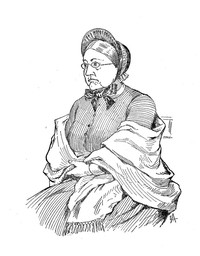Samantha Among the Brethren, Complete by Marietta Holley (the beginning after the end read novel .txt) 📗

- Author: Marietta Holley
Book online «Samantha Among the Brethren, Complete by Marietta Holley (the beginning after the end read novel .txt) 📗». Author Marietta Holley
Wall, we all got drippin' wet a-goin' home, for Cephas insisted on our gettin' out at the grave, for he had hired some uncommon high singers (high every way, in price and in notes) to sing at the grave.
And so we disembarked in the drippin' rain, on the wet grass, and formed a procession agin. And Cephas had a long exercise light there in the rain. But the singin' wuz kinder jerky and curius, and they had got their pay beforehand, so they hurried it through. And one man, the tenor, who wuz dretful afraid of takin' cold, hurried through his part and got through first, and started on a run for the carriage. The others stood their grounds till the piece wuz finished, but they put on some dretful curius quavers. I believe they had had chills; it sounded like it.
Take it altogether, I don't believe anybody got much satisfaction out of it, only Cephas. S. Annie sp'ilt her dress and bonnet entirely—they wuz wilted all down; and she ordered another suit jest like it before she slept. Wall, the next mornin' early two men come with plans for monuments. Cephas had telegrafted to 'em to come with plans and bid for the job of furnishin' the monument.
And after a good deal of talk on both sides, Cephas and S. Annie selected one that wuz very high and p'inted.
The men stayed to dinner, and I said to Cephas out to one side—
“Cephas, that monument is a-goin' to cost a sight.”
“Wall,” sez he, “we can't raise too high a one. Wellington deserved it all.”
Sez I, “Won't that and all these funeral expenses take about all the money he left?”
“Oh, no!” sez he. “He had insured his life for a large amount, and it all goes to his wife and children. He deserves a monument if a man ever did.”
“But,” sez I, “don't you believe that Wellington would ruther have S. Annie and the children settled down in a good little home with sumthin' left to take care of 'em, than to have all this money spent in perfectly useless things?”
“Useless!” sez Cephas, turnin' red. “Why,” sez he, “if you wuzn't a near relation I should resent that speech bitterly.”
“Wall,” sez I, “what do all these flowers, and empty carriages, and silver-plated nails, and crape, and so forth—what does it all amount to?”
“Respect and honor to his memory,” sez Cephas, proudly.
Sez I, “Such a life as Wellington's had them; no body could take 'em away nor deminish 'em. Such a brave, honest life is crowned with honor and respect any way. It don't need no crape, nor flowers, nor monuments to win 'em. And, at the same time,” sez I dreamily, “if a man is mean, no amount of crape, or flower-pieces, or flowery sermons, or obituries, is a-goin' to cover up that meanness. A life has to be lived out-doors as it were; it can't be hid. A string of mournin' carriages, no matter how long, hain't a-goin' to carry a dishonorable life into honor, and no grave, no matter how low and humble it is, is a-goin' to cover up a honorable life.
“Such a life as Wellington's don't need no monument to carry up the story of his virtues into the heavens; it is known there already. And them that mourn his loss don't need cold marble words to recall his goodness and faithfulness. The heart where the shadow of his eternal absence has fell don't need crape to make it darker.
“Wellington wouldn't be forgot if S. Annie wore pure white from day today. No, nobody that knew Wellington, from all I have hearn of him, needs crape to remind 'em that he wuz once here and now is gone.
“Howsomever, as fur as that is concerned, I always feel that mourners must do as they are a mind to about crape, with fear and tremblin'—that is, if they are well off, and can do as they are a mind to; and the same with monuments, flowers, empty coaches, etc. But in this case, Cephas Bodley, I wouldn't be a doin' my duty if I didn't speak my mind. When I look at these little helpless souls that are left in a cold world with nothin' to stand between them and want but the small means their pa worked so hard for and left for the express purpose of takin' care of 'em, it seems to me a foolish thing, and a cruel thing, to spend all that money on what is entirely onnecessary.”
“Onnecessary!” sez Cephas, angrily. “Agin I say, Josiah Allen's wife, that if it wuzn't for our close relationship I should turn on you. A worm will turn,” sez he, “if it is too hardly trampled on.”
“I hain't trampled on you,” sez I, “nor hain't had no idea on't. I wuz only statin' the solemn facts and truth of the matter. And you will see it some time, Cephas Bodley, if you don't now.”
Sez Cephas, “The worm has turned, Josiah Allen's wife! Yes, I feel that I have got to look now to more distant relations for comfort. Yes, the worm has been stomped on too heavy.”
He looked cold, cold as a iceickle almost. And I see that jest the few words I had spoke, jest the slight hints I had gin, hadn't been took as they should have been took. So I said no more. For agin the remark of that little bad boy came up in my mind and restrained me from sayin' any more.
Truly, as the young male child observed, “it wuzn't my funeral.”
We went home almost immegiately afterwards, my heart nearly a-bleedin' for the little children, poor little creeters, and Cephas actin' cold and distant to the last And we hain't seen 'em sence. But news has come from them, and come straight. Josiah heerd to Jonesville all about it. And though it is hitchin' the democrat buggy on front of the mare—to tell the end of the funeral here—yet I may as well tell it now and be done with it.
The miller at Loontown wuz down to the Jonesville mill to get the loan of some bags, and Josiah happened to be there to mill that day, and heerd all about it.
Cephas had got the monument, and the ornaments on it cost fur more than he expected. There wuz a wreath a-runnin' round it clear from the bottom to the top, and verses a kinder runnin' up it at the same time. And it cost fearful. Poetry a-runnin' up, they say, costs fur more than it duz on a level.
Any way, the two thousand dollars that wuz insured on Wellington's life wuzn't quite enough to pay for it. But the sale of his law library and the best of the housen' stuff paid it. The nine hundred he left went, every mite of it, to pay the funeral expenses and mournin' for the family.
And as bad luck always follers on in a procession, them mortgages of Cephas'ses all run out sort o' together. His creditors sold him out, and when his property wuz all disposed of it left





Comments (0)